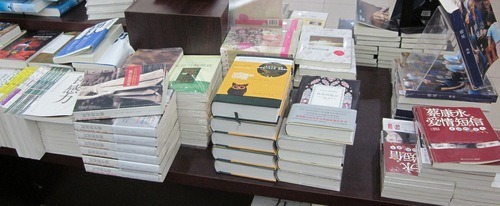Nearly two years ago, when I translated Yang
Jisheng's response to Dikötter's strange comments on Tombstone,
I said I was intensely interested to find out whether Mao really said "It
is better to let half of the people die so that the other half can eat their fill,"
and if he did, in what context. I received a couple of clues, but none
provided the complete context, and I have been left wondering since. I even
sent an email to Yang Jisheng asking if he knew about this Mao quote, but did
not hear back – perhaps the email address I got from a journalist friend was no
longer valid.
Amazingly, last week the answer came to me by accident, as I
was reading a scholarly article written by Anthony Garnaut, a historian at
Oxford, published in the journal China Information.
In his article,
"Hard facts and
half-truths: The new archival history of China's Great Famine," Garnaut finds out that the Mao quote in question is not from a speech Mao delivered on March 25, 1959 as Dikötter
claims, but it represents an impromptu response Mao made to Bo Yibo's
report on the implementation of the industrial plan in the days that followed. "The
comment is preceded by several remarks by Mao about Party oversight of the
industrial sector, none of which touch upon agriculture or rural welfare."
Mao was weighing in on how many projects should be undertaken to accomplish the
plan set forth in Bo's report. Mao says:
If we want to fulfill the plan, then we need to greatly reduce the
number of projects. We need to be resolute in further cutting the 1,078 major
projects down to 500. (要完成计划,就要大減项目。1078个项目中还应該堅決地再多削減,削到500个。)
To distribute resources evenly is a way to sabotage the Great Leap
Forward. (平均使用力量是破坏大跃进的办法。)
If all are unable to eat their fill, then all will die. It is better
for half to die, so that half of the people can eat their fill. (大家吃不飽,大家死,不如死一半,給一半人吃飽。)
"The ‘people’ whom Mao was willing to let die of
starvation turn out to be not people at all," Garnaut concludes, "but
large-scale industrial projects."
I'm glad this fact is clarified, not because it mitigates
Mao's guilt (it doesn't), but it supports the conclusion I reached in my LARB review
of the two books by Yang and Dikötter respectively, that "the catastrophe was not a deliberate
act of mass murder like the Holocaust, as Dikötter suggests. Rather, it was the
result of policy failures from a governance system based on the control of
ideology and information." This distinction is important if there are any
lessons to be learned for today's leaders.
Another China scholar once wrote me – after reading my LARB review – that Mao's
monstrous moral failing was not in the
motivation of starting the Great Leap Forward which turned out to be disastrous,
but in his attitude toward criticism of his policies in the aftermath. I couldn't agree more
with this assessment.A question remains: did Dikötter know what Mao meant but intentionally misinterpret it for wanting a smoking gun, or was his Chinese not good enough for him to know what he was doing?
By the way, Garnaut's article also analyzes Dikötter's repeated assaults on Yang
Jisheng and his unacknowledged use of Yang's research results. I must say that,
to date I still don't quite understand Dikötter's motivation in turning around
on someone who had helped him generously with his research.
